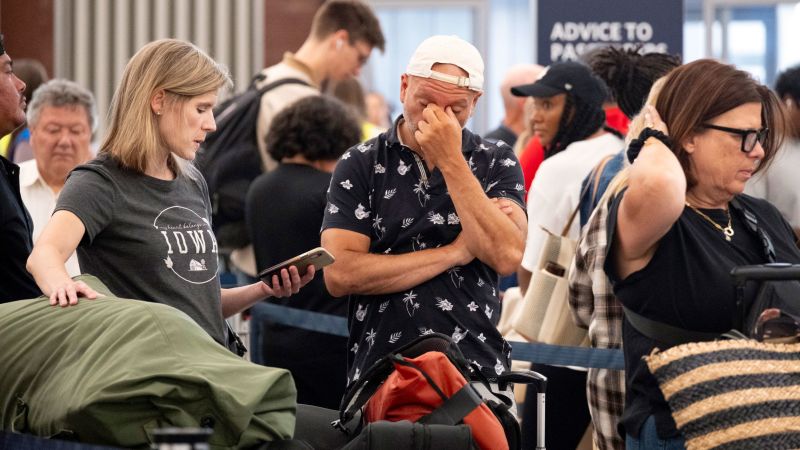CNN
—
Four days after a faulty software update from a cybersecurity company unexpectedly brought down computers and technical systems across the world, airlines and some other companies are still experiencing delays and other technical problems.
The “largest IT outage in history” – prompted by a software update for Microsoft devices late Thursday into the early hours of Friday – caused disorder at airports, outages for 911 services and challenges at healthcare facilities.
The outage affected an estimated 8.5 million Windows devices – less than one percent of all Windows machines, according to a Saturday blog post from Microsoft. But the effects were ubiquitous, with airlines, banks, businesses, schools and governments, along with some health and emergency services, across the world affected.
Costs from the outage could top $1 billion, Patrick Anderson, CEO of Anderson Economic Group, told CNN. But it’s unclear if – and how – any customers affected will be compensated.
Here’s what we know about the outage and its continued effects.
The outage was related to a software update rolled out by CrowdStrike, a major US cybersecurity firm. The software – used by numerous Fortune 500 companies, including major global banks, healthcare and energy companies, as well as by the US government — detects and blocks hacking threats.
CrowdStrike told customers early Friday the outages were caused by “a defect found in a single content update of its software on Microsoft Windows operating systems,” according to a post on X from CEO George Kurtz. The issue was identified and isolated, and engineers deployed an update to fix the problem, Kurtz said.
The company’s engineers took action to address the problem, according to an advisory viewed by CNN, which told customers to reboot their computers and perform other actions if they were still having technical issues. The issue is specific to Falcon, one of CrowdStrike’s main software products, and is not impacting Mac or Linux operating systems, according to the advisory. Crowdstrike says Falcon is designed to protect files saved in the cloud.
The company said the outage was not caused by a security incident or a cyberattack.
Kurtz later apologized to customers and said the company is “deeply sorry for the inconvenience and disruption.”
Chaos and confusion for travelers
Travelers continued to feel the impact of the failure for a third straight day on Sunday, with more than 1,800 US flights canceled and more than 9,900 delayed, according to the tracking website FlightAware. Major hotels, including Marriott International and some Hiltons, were impacted both in regard to payment processing and delays to check in-processes.
US-based carriers American Airlines, United Airlines, Delta Air Lines, Allegiant Airlines, SunCountry and Frontier Airlines all reported issues on Friday.
American Airlines said Friday morning it was able to “safely re-establish” operations. By Friday night, United said “most of our systems have recovered,” but cautioned there may still be some flight delays or cancellations as a result of the issues.
Delta Airlines paused all its flights Friday morning while its systems were offline, and more than 3,500 Delta and Delta Connection flights were cancelled through Saturday, according to the airline. More than 1,200 Delta flights were canceled on Sunday, after the carrier canceled 1,208 flights on Saturday, according to FlightAware.
Delta also announced that it would not be allowing unaccompanied minors to travel until July 24 due to the outage.
Transportation Secretary Pete Buttigieg spoke with Delta Air Lines CEO Ed Bastian Sunday afternoon as the air carrier continues to struggle with a high number of flight cancellations, according to the department.
“We continue to receive reports of unacceptable disruptions and customer service conditions at Delta Air Lines, including hundreds of complaints filed with our Department. I have made clear to Delta that we expect the airline to provide prompt refunds to consumers who choose not to be rebooked, and free rebooking and timely reimbursements for food and overnight hotel stays to consumers affected by the delays and cancellations, as well as adequate customer service assistance to all of their passengers,” Buttigieg said in a statement.
In a letter Sunday afternoon, Bastian apologized to customers, saying the extremely busy travel weekend contributed to the problem. Delta declined CNN’s request to comment further.
Other airlines were getting back on track over the weekend, including one of the world’s largest operators, Turkish Airlines, which said Saturday, “The global technical issue has been resolved. All our operations have returned to normal.”
The same day, Jetstar Japan, Hong Kong Express and Cebu Pacific airlines said their operations are gradually being restored after disruptions due to the global tech outage.
Even with the flawed computer update rolled back, it’s not a quick fix for airlines, which have computers at thousands of gates that will need to be individually rebooted, David Kennedy, cofounder of cybersecurity company Binary Defense, told CNN on Saturday.
“It’s not just as simple as rebooting. There’s a lot more steps and complexities in this that are involved,” Kennedy said. “There’s just not enough people at those airports, at those locations to go and do it.”
Amid the travel chaos, Buttigieg said earlier in a social media post Saturday he received reports of some airlines only offering flight credits to passengers for canceled flights.
“Let me be clear — you are entitled to get your money back promptly if your flight is canceled and you don’t take a rebooking,” Buttigieg said.
Hospitals, 911 systems and government agencies affected
The widespread usage of CrowdStrike’s software meant the outage penetrated numerous industries, including emergency communications, government services and healthcare.
Large hospital systems, including Mass General Brigham in Massachusetts, Penn Medicine in Pennsylvania, Mount Sinai Health System in New York all reported Friday they were affected by the outage.
Emory Healthcare in Atlanta said it had delayed “procedures at ambulatory surgical centers and hospitals are delayed until our systems are stabilized.”
Some cancer centers, including Dana-Farber Cancer Institute in Boston and New York’s Memorial Sloan Kettering Cancer Center, also paused certain procedures and scheduled appointments.
Several blood banks likewise experienced disruptions.
And in a few areas, including Arizona and Alaska, 911 services were briefly disrupted before being restored.
Government agencies, including Social Security offices and local Department of Motor Vehicles offices, also temporarily paused their operations due to the outage.
Public transportation in Washington, DC, and Pennsylvania were also affected by the outage but restored operations Friday.
And mail carriers UPS and FedEx said while they remained operational, they expected service delays Friday.










